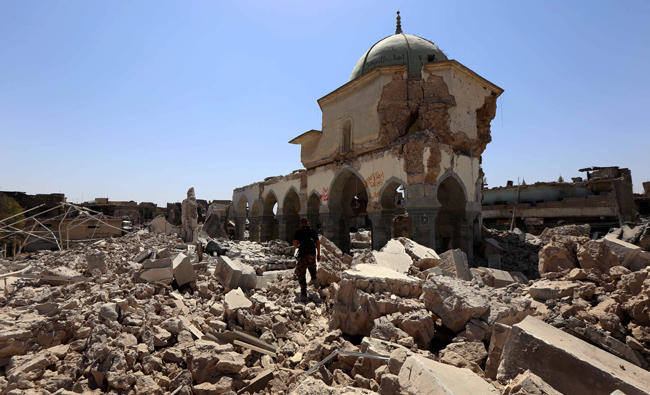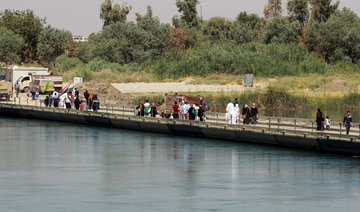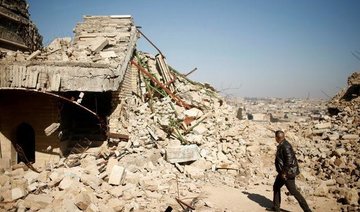MOSUL: With Mosul in ruins and nearly a million displaced, Iraq now faces the enormous task of restoring order and rebuilding its second city after driving out Daesh.
After eight months of gruelling fighting against Daesh, Iraqi forces are in control of Mosul.
But the famed Old City has been reduced to rubble and the iconic leaning minaret of its Al-Nuri mosque, the image of which adorns the 10,000 dinar note, lies in ruins.
The ancient, crowded alleys have become a silent maze of stone and iron skeletons, marked by mountains of rubble, craters and burned-out cars emitting a putrid odour of decaying bodies.
“The price of freedom is very high,” said Omar Fadel, a municipality employee who returned a month ago to his neighborhood of old Sinaaya, close to the ruins of the Al-Nuri mosque.
“We lost our houses, our money and above all, people, our loved ones.”
Lise Grande, the UN’s humanitarian coordinator for Iraq, said that Mosul represents “the biggest stabilization challenge the UN has ever faced — the scale, the complexity, the scope of it.”
Out of 54 residential quarters, “15 are destroyed, 23 moderately damaged, 16 lightly damaged,” she said.
In eight months of combat, 948,000 people fled their houses, far beyond the UN’s most pessimistic predictions of 750,000 displaced.
Like Fadel, some have already returned. But 320,000 are still living in camps and another 384,000 are staying with relatives or in mosques, living on humanitarian aid, according to the UN.
Iraqi Prime Minister Haider Al-Abadi declared the city “liberated” on July 9, but the threat of violence has not disappeared. An unknown number of jihadists mingled with the flood of civilians fleeing the fighting.
With few resources, “the local police can’t, at this stage, hold the area,” said Mohammed Ibrahim, a security official at the provincial council of Nineveh, of which Mosul is the capital.
The job of securing the city might be entrusted to a “joint force” made up of Iraq’s counterterrorism service, the federal police and the army, which led the battle, a US adviser to the federal police said.
Authorities also set up a provincial intelligence center, the first in Iraq, two months ago to “locate terrorist bases and sleeping cells, arrest and hand suspects over to the judiciary,” Ibrahim said.
Meanwhile, workers have begun the tough task of clearing the damage left by the fighting, revealing hundreds of civilians buried under the rubble.
The streets need to be cleared of explosive devices left by the jihadists.
Next begins the work of rebuilding. The UN says the first phase of “stabilization” — providing infrastructure, housing, education and a police force — will cost at least $707 million.
“In the heavily damaged districts that are almost completely destroyed, we have to expect that this will take months, if not years,” Grande said.
“The families who come from those districts — we are talking about 230,000 to 240,000 families — will probably not be able to go back to their homes for a very long time.”
The UN has called for more international aid to help reconstruct the city, but less than half the aid needed for 2017 has been donated so far.
Mosul residents do not want to see rebuilding efforts confined to Iraq’s government, which is seen as corrupt, sectarian and distant.
In Baghdad, “they think that all of Mosul is Daesh,” said Issam Hassan, a young man in an east Mosul market.
Political analyst Ziad Al-Zinjari said he was “not optimistic” about Mosul’s future.
“There are signs that the city will go back to square one, that the same mistakes will be repeated,” he said.
Many fear that “corrupt people and thieves” will take over important posts, armed groups will emerge again and the authorities are “lagging behind in the reconstruction and resumption of public services,” he added.
Despite the defeat suffered by Daesh, the groups that united to fight it could easily splinter as rivalries re-emerge.
Civil society activist Majed Al-Husseini said that unless Mosul is declared a disaster zone and foreign organizations are involved in reconstruction, “political conflicts will bring back murders in the streets.”
“Shiite militias are setting up in the city, which the Sunni majority sees as a provocation... the Kurds have their sights on the disputed areas (and) Sunni politicians have conflicts between them for personal interests,” he said.
Years of rule by Daesh has also created divisions.
Some pro-government tribes are demanding “compensation” from other tribes who had pledged allegiance to the jihadists before they will allow them back into the city.
“The most important national priority is national reconciliation,” Grande said.
But on both sides of the Tigris river dividing Mosul, residents say communal divisions are mainly a political creation.
“The city’s architecture will never be the same again, but the spirit of Mosul, the solidarity of the inhabitants, will not change.”
Iraq faces vast challenges in securing, rebuilding Mosul
Iraq faces vast challenges in securing, rebuilding Mosul

France congratulates new Lebanon president, calls for ‘strong government’

- French foreign ministry said Joseph Aoun's election “opens a new page" for Lebanon
PARIS: France on Thursday welcomed the election by Lebanese lawmakers of army chief Joseph Aoun as president after a two-year vacuum at the top, urging the formation of a strong government to drag the country out of a political and economic crisis.
Extending France’s “warm congratulations” to Aoun, the French foreign ministry said his election “opens a new page for the Lebanese” and urged “the appointment of a strong government” that can help the country recover.
Italian foreign minister to meet Syria's new rulers in Damascus

- Antonio Tajani said he would push Syria’s transitional government to pursue an “inclusive political process”
ROME: Italy’s Foreign Minister Antonio Tajani said Wednesday he would travel to Syria Friday where he plans to announce an initial development aid package for the country ravaged by years of war.
Tajani’s trip follows those by his French and German counterparts, who visited the Syrian capital last week to meet Syria’s new rulers after they toppled Bashar Assad's regime in a lightning offensive last month.
“It is essential to preserve territorial integrity and prevent (Syria’s) territory from being exploited by terrorist organizations and hostile actors,” Tajani told parliament.
Western powers have been cautiously hoping for greater stability in Syria, a decade after the war triggered a major refugee crisis that shook up European politics.
Tajani did not provide any details about what he called a “first package of aid for cooperation and development.”
Tajani said he would push Syria’s transitional government to pursue an “inclusive political process” that “recognizes and enhances the role of Christians as citizens with full rights.”
Ahead of his trip, Tajani is set Thursday to meet with the foreign ministers of France, Germany, Britain and the United States over the Syria situation, with the drafting of a new constitution and Syria’s economic recovery on the agenda.
The EU’s foreign affairs chief, Kaja Kallas, was expected in Rome for the meeting.
Thousands of Alawites mourn 3 killed by foreign Islamists: monitor, witness

- “Thousands of mourners gathered at the funeral of three Alawite farmers from the same family,” said the Syrian Observatory for Human Rights
- The civilians were killed on Wednesday in the village of Ain Sharqia
DAMASCUS: Thousands of Syrians from ousted President Bashar Assad’s Alawite community mourned on Thursday three civilians killed by foreign Islamist allies of the country’s new authorities, a war monitor and an attendee said.
Since Assad’s ouster, violence against Alawites, long associated with his clan, has soared, with the monitor recording at least 148 killings.
“Thousands of mourners gathered at the funeral of three Alawite farmers from the same family, including one child, killed by foreign Islamist fighters allied to Syria’s new authorities,” said the Syrian Observatory for Human Rights war monitor.
The civilians were killed on Wednesday in the village of Ain Sharqia, in the Alawite heartland of Latakia province, the Observatory said.
“Down with the factions,” some of those in attendance chanted in reference to armed groups, according to footage shared by the monitor.
Mourner Ali told AFP that people had called for those responsible for the killings to be punished and for foreign fighters to leave so that local policemen affiliated with the new authorities could take their place.
“We can’t have people die every day,” he said, asking to be identified only by his first name to discuss sensitive matters.
“We want security and safety to prevail; we support the transitional authorities. We do not want any more killings after today.”
Rami Abdel Rahman, who heads the Observatory, told AFP the mourners also demanded that Syria’s new rulers free thousands of detained soldiers and conscripts.
The Alawite community was over-represented in the country’s now-defunct armed forces.
On Tuesday, three Alawite clerics were also killed by unknown gunmen on the road from Tartus to Damascus, the monitor said.
Another cleric and his wife were found dead in the Hama countryside Thursday after they were abducted a day earlier.
Last month, angry protests broke out in Syria over a video showing an attack on an Alawite shrine, with the Observatory reporting one demonstrator killed in Homs city.
Syrian authorities said the footage was “old” and that “unknown groups” were behind the attack, saying republishing the video served to “stir up strife.”
The alliance spearheaded by the Islamist group Hayat Tahrir Al-Sham (HTS), which seized Damascus and ousted Assad on December 8 after a lightning offensive, has sought to reassure minority communities in the Sunni Muslim majority country.
Assad had long presented himself as a protector of minority groups.
Lebanon’s new president promises to rebuild what ‘Israel has destroyed’

- The Mediterranean country has been without a president since the term of Michel Aoun ended in October 2022
BEIRUT: Newly elected Lebanese president Joseph Aoun has promised to rebuild what the Israeli occupation has destroyed, in a speech before parliament after taking his oath of office.
The Lebanese state will be able to remove Israeli occupation and the effects of its aggression, Aoun said, after hurdling the second round of voting in parliament to become the country’s new president.
“I promise to reconstruct what Israel destroyed in the south and Beirut’s southern suburbs,’ he said.
The newly elected president also touched on the Palestinian issue, saying he rejects the settlement of Palestinian people and guaranteed their right to return.
He also pledged to work towards the best of relations with Arab countries, and cooperate with Syria to control the borders from both sides.
The Mediterranean country has been without a president since the term of Michel Aoun – not related – ended in October 2022, with tensions between the Iran-backed Hezbollah movement and its opponents scuppering a dozen previous votes.
During parliament’s first session on Thursday morning, 71 out of 128 lawmakers voted in favor of the army commander, short of the required 86, in the first round of the vote.
Thirty-seven members of parliament voted blank, including 30 lawmakers from the pro-Hezbollah bloc, according to a source close to it.
Twenty ballots were declared null and void.
Aoun received 99 votes during the second round, more than the minimum votes required for him to be voted into office.
But international pressure has mounted for a successful outcome with just 17 days remaining in a ceasefire to deploy Lebanese troops alongside UN peacekeepers in south Lebanon after a Hezbollah-Israel war last autumn.
Speaker Nabih Berri then suspended the session until 2:00 p.m. sparking outrage from some lawmakers who demanded an immediate second vote.
The president’s powers have been reduced since the end of the 1975-1990 civil war. But filling the position is key to overseeing consultations toward naming a new prime minister to lead a government capable of carrying out reforms demanded by international creditors.
Lebanon’s divided political elite usually agrees on a consensus candidate before any successful parliamentary vote is held.
Aoun, who will turn 61 on Friday, appears to have the backing of the United States and key regional player Saudi Arabia.
US, Saudi and French envoys have visited Beirut to increase pressure in the run-up to the vote.
Pope Francis on Thursday expressed hope that Lebanon could “possess the necessary institutional stability... to address the grave economic and social situation.”
Several lawmakers have objected to what they see as foreign interference in the vote.
In protest, some rendered their ballot void by voting for “sovereignty and the constitution,” a reference to the fact that Aoun’s election would also require a constitutional amendment.
Under Lebanon’s constitution, any presidential candidate must have not held high office for at least two years. Aoun is still head of the army, after extending his mandate past his planned retirement.
Critics have accused Hezbollah and allies of scuppering previous votes.
But a full-fledged war between Israel and Hezbollah last autumn dealt heavy blows to the Shiite militant group, including the death of its longtime leader Hassan Nasrallah in an air strike.
In neighboring Syria, Hezbollah has lost a major ally after militants toppled President Bashar Assad last month.
Under multi-confessional Lebanon’s power-sharing system, the president must be a Maronite Christian. Aoun is Lebanon’s fifth army commander to become president, and the fourth in a row.
Military chiefs too are, by convention, Maronites.
The new president faces daunting challenges, with the truce to oversee on the Israeli border and bomb-damaged neighborhoods in the south, the east and the capital to rebuild.
Since 2019, Lebanon has been gripped by the worst financial crisis in its history.
The Hezbollah-Israel war has cost Lebanon more than $5 billion in economic losses, with structural damage amounting to billions more, according to the World Bank.
UN migration agency appeals for $73 million in aid for Syria

- UN’s International Organization for Migration more than doubling an appeal launched last month for Syria
- The Geneva-based agency said it was working to reestablish its presence inside Syria
GENEVA: The UN migration agency on Thursday expanded an aid appeal for Syria to over $73 million, as the country transitions after years of civil war and decades of dictatorship.
The United Nations’ International Organization for Migration said it was more than doubling an appeal launched last month for Syria, from $30 million to $73.2 million, with the aim of assisting 1.1 million people across Syria over the next six months.
“IOM is committed to helping the people of Syria at this historical moment as the nation recovers from nearly 14 years of conflict,” IOM chief Amy Pope said in a statement.
“IOM will bring our deep experience in humanitarian assistance and recovery to help vulnerable communities across the country as we work with all partners to help build a better future for Syria.”
The Geneva-based agency said it was working to reestablish its presence inside Syria, after exiting Damascus in 2020, building on its experience working there in the preceding two decades, as well as on its cross-border activities in the past decade to bring aid to northwest Syria.
It said it aimed “to provide immediate assistance to the most at-risk and vulnerable communities, including displaced and returning groups, across Syria.”
The requested funds, it added, would be used to provide essential relief items and cash, shelter, protection assistance, water, sanitation, hygiene and health services.
They would also go to providing recovery support to people on the move, including those displaced, or preparing to relocate.
The dramatic political upheaval in Syria after the sudden ousting last month of strongman Bashar Assad after decades of dictatorship has spurred large movements of people.
Half of Syria’s population were forced from their homes during nearly 14 years of civil war, with millions fleeing the country and millions more displaced internally.
The UN refugee agency has said it expects around one million people to return to the country in the first half of this year.
And by the end of 2024, the UN humanitarian agency had already recorded the returns of nearly 500,000 people who had been internally displaced inside Syria, IOM pointed out.




















